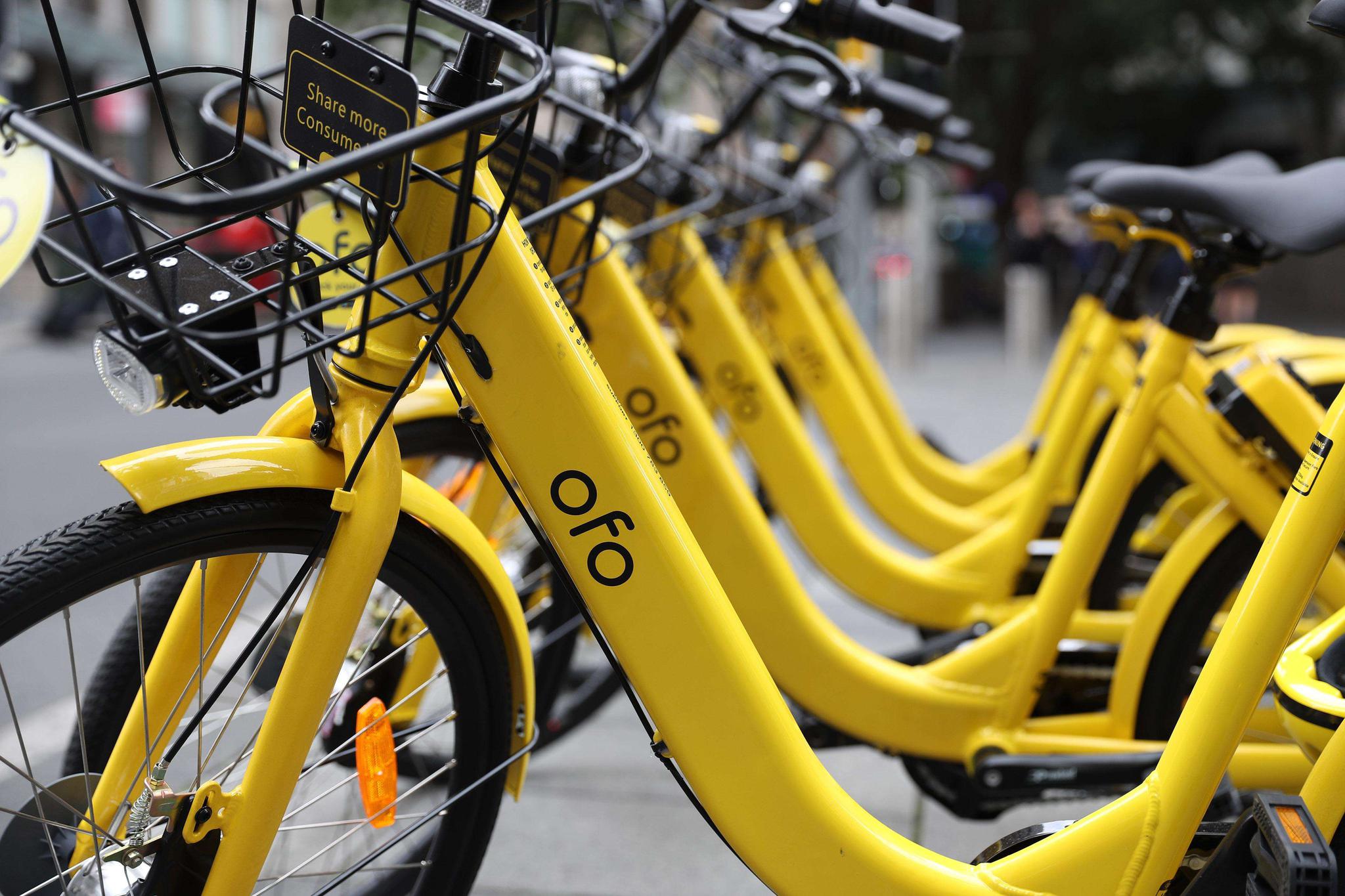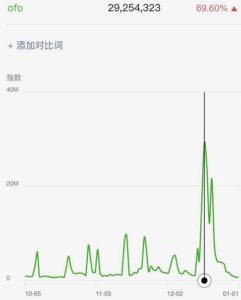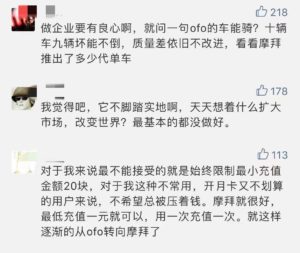The reaction and reflection of Chinese people on the ofo crisis
All eyes in China are now on ofo, a Beijing-based bicycle sharing company founded in 2014. The dockless system uses its smartphone app to unlock and locate nearby bicycles. In 2017, it had deployed over 10 million bicycles in 250 cities and 20 countries. As a pioneer of the bicycle sharing system in China, ofo has received a lot of honor; its business model was praised as one of the “Four Great New Inventions in Modern China” by Chinese state media. This time, ofo is again in the spotlight, but for a totally different reason. Chinese people are spectating ofo’s struggle for survival. Besides expressing anger, disappointment and sympathy, many Chinese consumers are further questioning issues like the citizen quality, city management and moreover, the responsibilities of the authorities.
What do Chinese netizens say about ofo?
A WeChat account posted the video [No Place to Place] and obtained over 100K views and caused a heated discussion in the comment session:
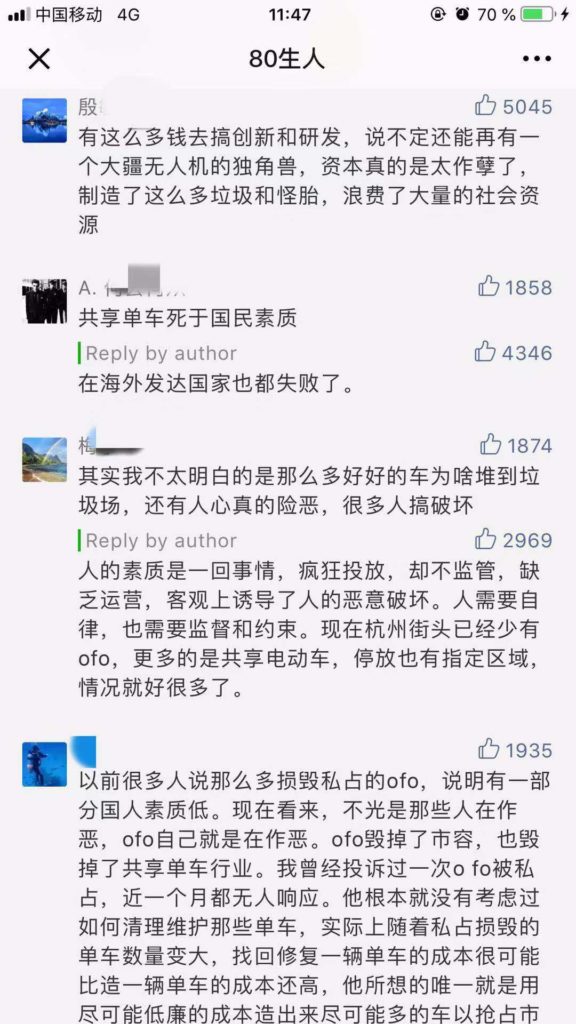
- Shared bicycles died from low-quality citizens. (1858 likes)
- Reply by author: It also failed in developed countries. (over 4K likes)
- I don’t really understand why so many bicycles ended up in the dump. People’s hearts are so vicious, so much sabotage. (1874 likes)
- Reply by author: People’s quality is one thing, putting a massive number of bicycles into the market without supervision and operation caused all these sabotages. The situation is now much better in Hangzhou, although there are so many shared-e-bikes, they all park in assigned areas. (almost 3K likes)
- …… ofo destroyed the urban appearance as well as the whole bicycle sharing industry. I once reported an illegal occupation, no response for almost one month. The company has never thought of the maintenance and the liquidation…… (almost 2K likes)
Ofo’s deposit crisis
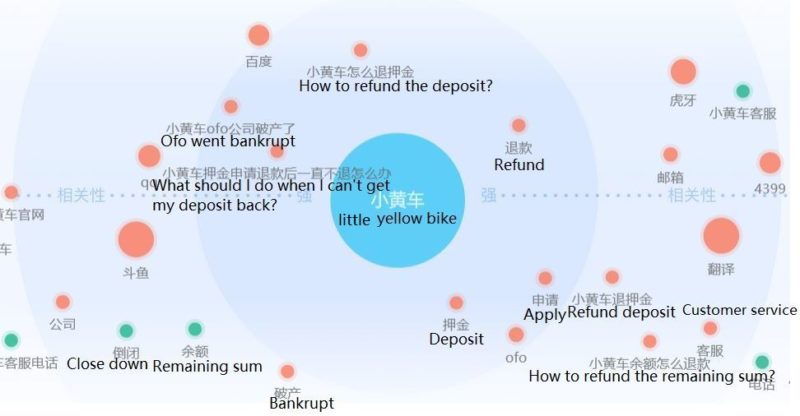
Only a couple of years ago, Chinese consumers discussed ofo with joy and excitement, because the system was novel and offered convenience for them. These bright yellow bicycles were everywhere in the city and provided a perfect “last mile solution”. Chinese consumers have given ofo a cute and friendly name: Xiaohuangche (小黄车, little yellow bike), the easily rememberable nickname once had become a general designation for a shared bicycle in China. But now, according to Baidu, currently, the associated terms of Xiaohuangche are phrases like deposit refund, bankrupt and how to get the remaining sum back.

There is even a topic on Weibo, Chinese biggest micro-blogging platform, which could be translated to: #WhatsYourPlaceInOfosDepositRefundLine. This hashtag got over 2 million views and Chinese netizens are posting the screenshots of their ofo deposit refund status. From a post on Jan.7, 2019, we can see there are already over 14 million ofo users are lining up to get their deposit back, which normally amounts to 199 RMB (30 USD).
Chinese netizens are mocking up the situation by saying: this might be the longest line I have ever been waiting in, and many of them don’t think they could ever get the money back. There are even people who charge and deposit and then apply for a refund, just to be a part of it.
|
|

Both on WeChat Index and Baidu Index, the search frequencies reached the peaks in the week of Dec. 17, 2018. On that day, due to the rumor of users getting their deposit back by going to the office directly, hundreds of ofo users were waiting outside of the company’s Beijing headquarters to ask for immediate deposit returns. On Dec. 19, Dai Wei, the founder of ofo, announced a full staff letter, admitting “the company has been carrying immense cash-flow pressure for the whole year”, but he hopes that “every ofo staff will agree and keep the faith: no running-away, but fighting bravely for survival and taking the responsibility for every cent they own their customers as well as other creditors.”
Chinese netizens were mocking Dai and his company by calling this letter a “chicken soup for the soul”, since it neither provided any solution for the company’s crisis nor answers for their users and creditors.
Chinese netizens’ reaction on WeChat and Zhihu
On WeChat, the top comments of posts analyzing the ofo crisis are mostly complaints about the user experience, e.g. hard to find a bicycle on the street in a good condition; the amount of deposit and prepay are too high. There are also many Chinese netizens blaming ofo for being irresponsible. Like one netizen on WeChat commented: “Start talking about passion when they supposed to take responsibility, that’s the pattern of many companies.”
Yet we can still see many voices of support, saying they have been an ofo fan from the very beginning and won’t ask for a deposit refund. One comment said:” ofo, I will support you! The shared bicycle is a good product and it has provided me so much convenience. I believe every innovation requires a process of development. Learn from the experience and fight through a hard time!”
|
|
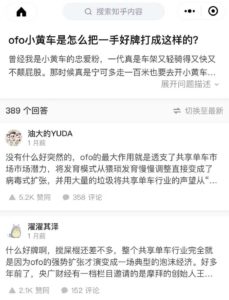
On Zhihu (Chinese largest question-answer platform), someone asked the question: how ofo managed to end up like this by having a so good hand at the beginning? The top two answers with thousands of likes both compared ofo with Mobike, another one of the largest Chinese bicycle sharing company. Both answers are blaming ofo for destroying the whole bicycle-sharing industry. Top comments compared ofo with Mobike and told lots of user experiences with both brands; almost everyone agreed that Mobike is better.
Chinese consumers are price-sensitive, yet good user experience is still the key to success
Ofo was a pioneer in China’s bike-sharing market, attracting US$2.2 billion of funding from big-league domestic and overseas investors, including DST Global, Coatue Management, Matrix Partners China and Alibaba Group Holding. With all the financial support they had, instead of focusing on providing high-quality product and service, ofo chose to seize the Chinese bicycle sharing the market with the advantage of price and the number of bicycles on street. Chinese consumers are price-sensitive, yet without the basic quality of service, there is no way for a business to last in China. From the reactions of Chinese netizens, we can see that Chinese consumers have matured a lot and became more rational regarding issues like this. Alone with low price or a novel business model will maybe attract consumers at the beginning, but a high quality of product/service and good user experience are still the key to success.
Recently, there has been a lot of discussion on Chinese social media about Luckin Coffee, the emerging coffee chain opened about 2000 outlets across China in just one year and plans to expand to 4500 by the end of 2019, which would take it ahead of Starbucks to become China’s biggest coffee chain. One post on WeChat compared Luckin Coffee with ofo, and raised the question: will Luckin Coffee become the next ofo? Both companies achieved huge success within a very short time through the new business model and outstanding promotion strategy. But what happens after that? From the impasse ofo is facing now, what have we learned to avoid becoming the next ofo is indeed a good question.
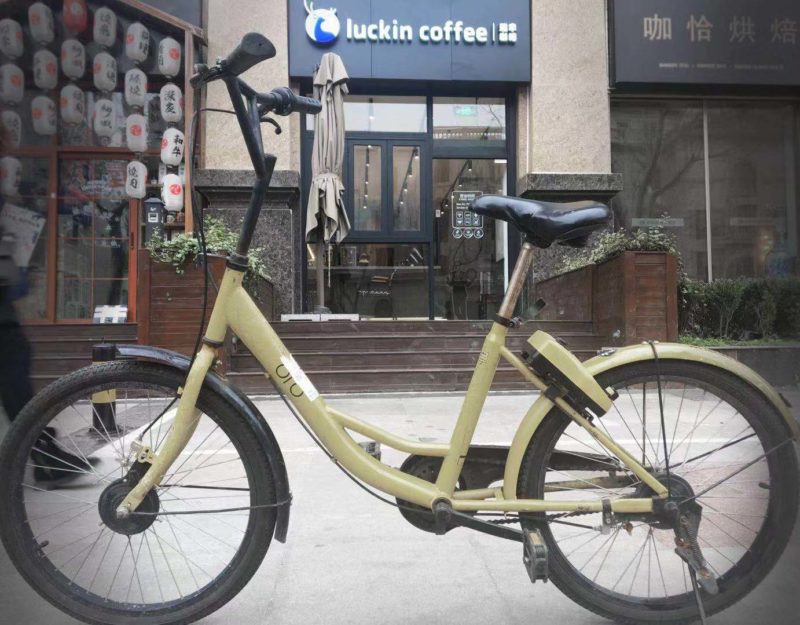
Author: Chencen Zhu
The Chinese market is quite unique and specific one, so there is no one recipe of a strategy for startups to enter the Chinese market or for an existing company to solve a problem. Based on Daxue Consulting’s experience, there are always unique cases and corresponding unique solutions. Daxue Consulting’s team leverages various methodologies to provide your company with pragmatic, agile and close-to-market research approach. One of them is ethnographic research analysis in China which offers practical advantages regarding the thorough understanding of the context and cultural background shaping Chinese consumers.


